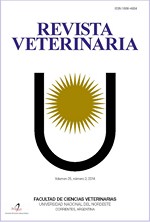Use of drugs in pregnant canine
DOI:
https://doi.org/10.30972/vet.3416613Keywords:
Pregnancy, canines, therapeutic, physiological alterations, ADMEAbstract
Physiological changes during pregnancy induce profound alterations in the pharmacokinetic properties of many drugs. These changes affect the distribution, absorption, metabolism, and excretion of drugs and therefore may affect their pharmacodynamic properties. An understanding of both the physiology of pregnancy and the specific pharmacology of the different agents is necessary to achieve effective treatment and limit maternal and fetal risk. Unfortunately, most drug studies exclude pregnant females, even when there are pathological entities that need to be treated during pregnancy (pain, infectious processes, etc). This review begins with a reminder of the basic concepts of pharmacokinetics and their clinical relevance. Physiological changes in pregnancy and their consequences on the pharmacokinetic and pharmacodynamic properties of many drugs are described. As a closure, the therapeutic categories most commonly indicated in pregnant females are discussed.
Downloads
Downloads
Published
How to Cite
Issue
Section
License
Revista Veterinaria (Rev. Vet.) maintains a commitment to the policies of Open Access to scientific information, as it considers that both scientific publications as well as research investigations funded by public resources should circulate freely without restrictions. Revista Veterinaria (Rev. Vet.) ratifies the Open Access model in which scientific publications are made freely available at no cost online.











.jpg)
.jpg)



